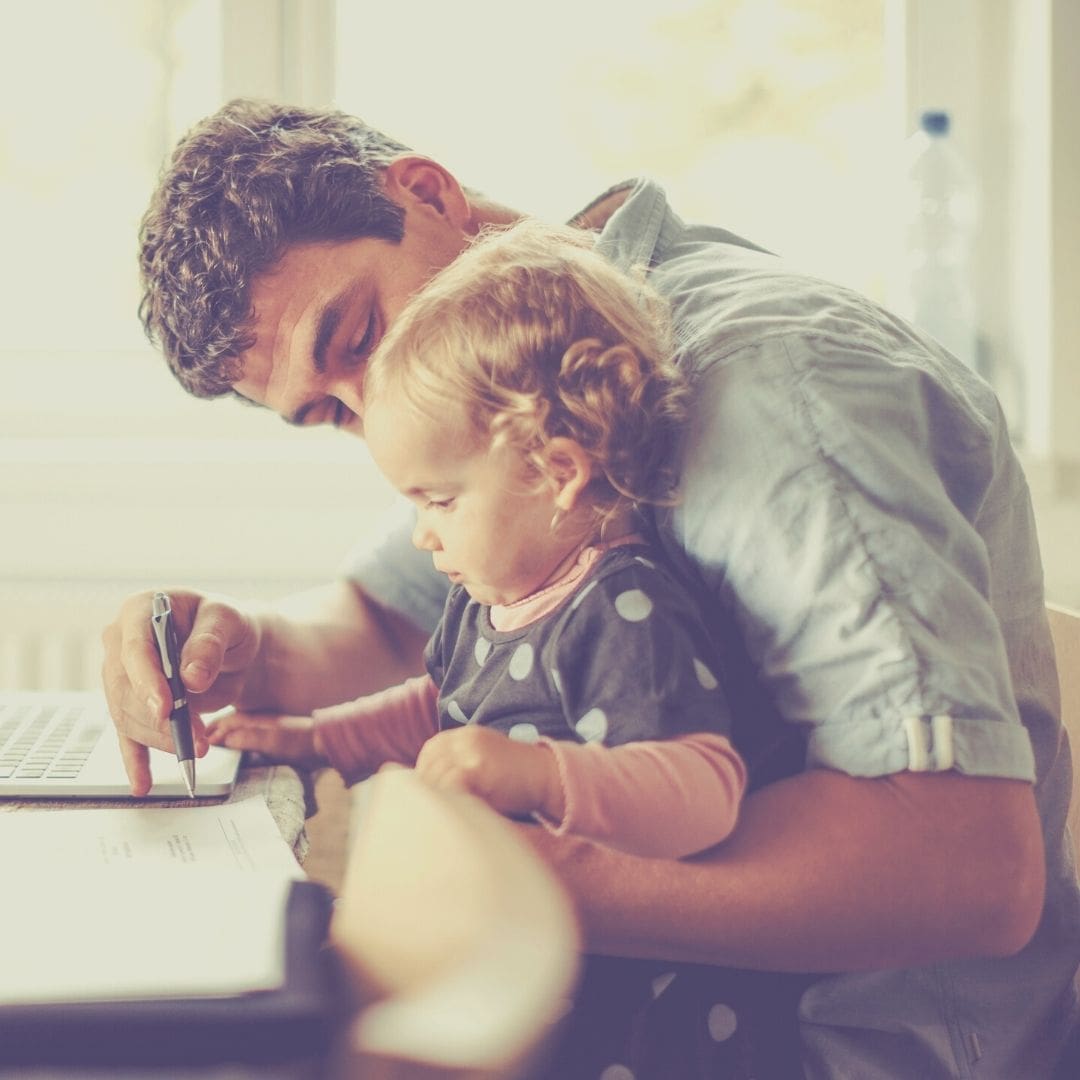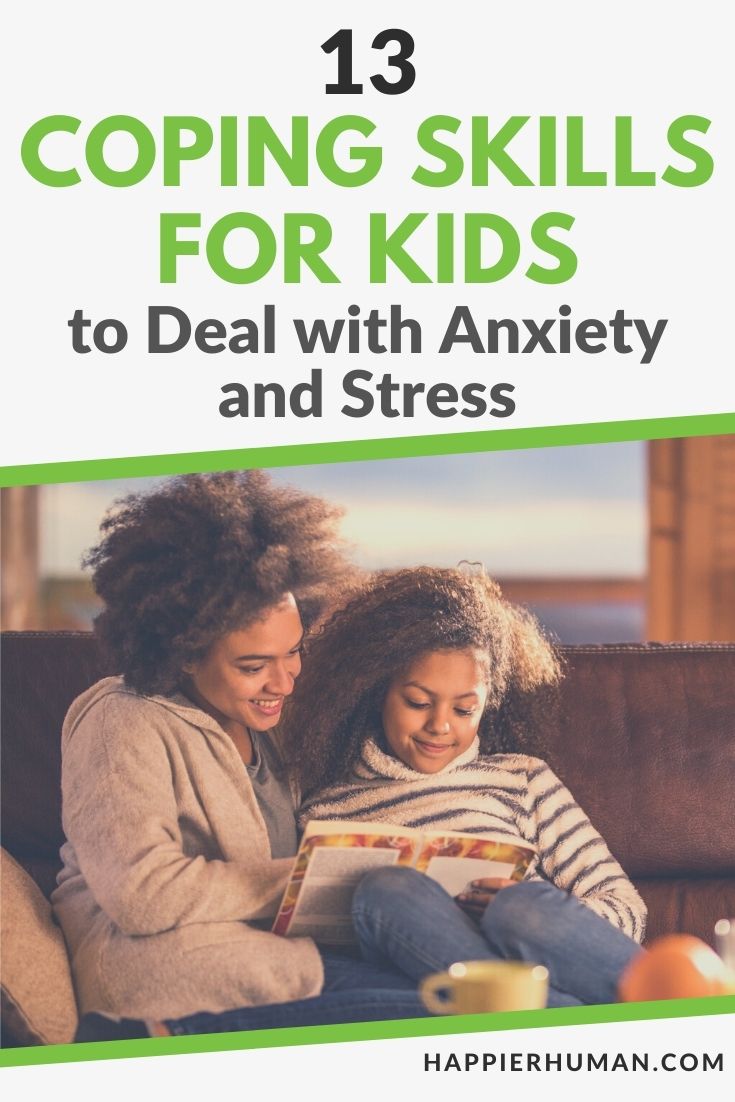Just as adults do, kids run a gamut of emotions every day.
They may be hurt, angry, shy, nervous, sad, skeptical, anxious.
Teaching them to cope with their feelings in a healthy way is crucial in their social and emotional development… and a skill they will likely carry with them into adulthood.
Teaching coping skills for kids is just as important as teaching them to be good people, respectful of others. It will also teach them self-respect and build confidence.
What are Coping Skills?
Coping skills are the methods and steps one takes to deal with stressful or uncomfortable situations. They are designed to help one tolerate, minimize and effectively deal with something negative and make it positive.
Without having a handle on coping skills, kids often have the tendency to lash out or displace their feelings. For instance, if your child is being bullied at school… they may choose to pretend they are sick instead of going to school and confronting the issue head on.
There are many benefits to teaching coping skills at an early age, among them are:
Types of Coping Skills
Emotion-Driven Coping Skills for Kids
These coping skills are designed to help a child confront and examine their feelings so that they don’t feel anxious or stressed.
Often, these emotion-based situations are out of the child’s hands… such as a death in the family or sadness over a friend who’s moved away.
Problem-Oriented Coping Skills for Kids
These coping skills are meant to help your child face a problem or situation head on and take the necessary steps to resolve the issue.
The child will usually have some degree of control over the situation… such as standing up for a friend who is being teased, or letting a teacher know they are having trouble in a particular subject and need extra help.
Sidenote: By crafting a morning routine, you will reduce a lot of the stress and anxiety that happens throughout the day. Take a few minutes to learn how to create a morning routine for your kids by watching the video below.
13 Coping Skills for Kids
In this article, we will cover 13 coping skills for kids that you may find helpful for a variety of situations.
1. Make use of workbooks or story books.
There are many books to help children of all ages confront and sort through their feelings, each designed to put their emotions into words or images they can relate to. Workbooks are a great way to let your child express themselves in an age appropriate way.
2. Start a feelings journal.
Feelings journals are similar to workbooks, but involve a little more work on the child’s part, as they should be able to put their feelings into words more than pictures.
You may even want to consider journaling yourself, which may give you a different perspective into your child’s mindset.
3. Channel their inner artist.
Art is a wonderful form of expression. There is no wrong way to create it, and opinions of it are subjective. The best part is, many activities can constitute as are. Some tools you may want to consider include:
4. Identify a comfort object.
You may remember having a friend in college who slept with a tattered stuffed bear every night. My freshman year roommate did.
And to be honest, it’s not all that uncommon or weird.
Small objects can bring great comfort to someone trying to cope with raw emotions or change in their life. In most cases, the object represents consistency and is usually tied to a happy memory.

All of my kids still sleep with the cuddle animal we gave them as infants. My oldest is 11 and still has “Monk” in his bed at night. Even if it’s buried under a pillow.
Spend some time talking with your child about something they own that they associate with happiness and safety. Maybe it’s a blanket, a favorite shirt or a picture on their nightstand.
Encourage them to hold this object whenever they feel an emotion they don’t like or are uncomfortable with, in the hopes of trying to redirect their focus on the positives.
5. Listen to music.
Music can drum up all kinds of emotions.
I’m sure you’ve been driving in the car when a song comes on that takes you back to another time in your life.
Maybe you’re reminded of a former lover, an old friend, a deceased relative… or the day your son took his first steps.
Listening to music can be one of the best coping skills for kids. Encourage them to select a song that describes what they are feeling.
Then, play some music to get them back into a calm place. Classical, new wave or jazz are always good options for me.
If your child is musically inclined, encourage them to play an instrument or start dancing to set their emotions free.
6. Read a book.
Books are a wonderful way to escape reality.
No matter how bad your life gets… you can always find a book with a character going through something similar, or worse.
If your child needs to feel like someone else can relate to what they are feeling, and they aren’t quite ready to talk about it with you, encourage them to read a book.
Conversely, if your child is younger and not capable of this, you can suggest reading one of their favorite stories when they appear to be having a bad day.
Bring them back to a happy place and maybe they’ll slowly start to open up.
7. Create a diversion.
There is no law that states coping skills for kids have to nip a problem in the bud immediately.
In fact, sometimes a distraction can be just what the doctor ordered to get them feeling better.
If your child appears to be sassing you for no reason, or screaming at her younger sister… why not grab a can of whipped cream and squeeze it on her head?
Kid sulking at the dinner table? Start a food fight.
If your son comes home from school and goes straight to his room, shutting the door… try giving a knock and offer to take him out for ice cream.
Here’s the thing… there is a time and a place when actions speak louder than words.
Doing something unexpected and fun for a while may give your child the time they need to mull things over and cope with what is really going on when they’re ready to. And because you didn’t push the issue, you’ll likely be the one they come to.
8. Watch a funny YouTube video, cartoon or movie.
Whoever said, “laughter is the best medicine” wasn’t wrong.
No matter how bad something seems, there is nothing like a good laugh to take your mind off it for a while.

In fact, there are documented emotional and physical benefits associated with laughter. Among the most noteworthy are:
Teaching your child to allow themselves to laugh, even when they may not feel like it, will help get them into a mindset where they are capable of handling almost anything.
9. Force them to have a good cry.
Similar to laughter, crying can have positive physical and emotional benefits for people.
In fact, some psychologists consider crying to be an acceptable self-soothing coping skill, citing that “in times of deep pain, anger and stress, crying can be a healthy coping option.
Though more often associated with negative emotions, crying is more than just a symptom of sadness. Research suggests crying is an emotional release mechanism useful to your mental health for a number of reasons”.
If you feel your child is going through something, encourage them to have a good cry.
Maybe it’s a movie that always gets them… or a tv show, or song.
Looking through old pictures can also do the trick.
10. Get regular exercise.
We have all been told about the benefits of exercise on our bodies, but not many people realize the tremendous effect it can have on one’s mindset and mood.
Exercise produces endorphins, which are chemicals produced by the body to relieve stress and pain. They are also credited with elevating mood and creating a general sense of optimism.
Whether it’s playing catch or soccer together, or going for a walk or hike, getting your child regular exercise can do wonders for their self esteem.
Getting outside as much as possible is also another great way to lift spirits!
And if they need to get aggression out, things like kickboxing or martial arts can be a great outlet.
11. Positive self talk and encouragement.
Nine times out of 10, if your child is feeling bad about something… they are self sabotaging themselves to some extent.
Meaning, they are likely trying to talk themselves into not confronting a problem or emotion. They may think to themselves things like, “you’ll be a snitch if you rat out this bully” or “you’ll never get a boyfriend if you don’t lose 10 pounds”.
Teaching your child the importance of positive self talk and encouragement is one of the most crucial coping skills for kids.
Role play and have them put themselves in another person’s shoes. For instance, ask your daughter what she would say to her best friend if she felt she was too fat to get a boyfriend.
Your daughter would likely tell her friend that she is beautiful and that looks aren’t everything. That we want someone to love us for the person we are and not how much we weigh.
Conditioning your child to treat themselves with the same respect they would treat a close friend or family member is the key to making positive self talk happen.
Have them think of the best case scenario, instead of just the worst, and they will start to see that a solution is in sight.
12. Utilize a “calm down” kit.
Think of this like a first aid kit for the mind.
Put together a box, tin, or small backpack with items designed to help your child feel calm and relaxed. Things you might want to include are:
You can decorate the kit if you want and even ask your child for suggestions as to what should go into the kit. If they feel a part of the process, they may be more inclined to rely on the kit when they are having a bad day.
13. Practice meditation and mindfulness.
The practices of mediation and mindfulness go back centuries.
And the benefits of both are undeniable.
It is never too early to teach a child these methods to help them cope with life’s most challenging moments.
Sometimes, the best thing we can do for our children (and ourselves, too) when something is bothering them is to encourage silence. Explain the importance of listening to themselves and exploring a deeper awareness of their feelings.
Decide on a quiet place they can go, free of any distractions, whenever they feel the need to reconnect with their inner self.
Some kids do better if you set a timer, so they know the silence is coming to an end eventually.
Once they’ve finished, they will likely come out recharged and ready to face their problems head on.
Final Thoughts on Coping Skills for Kids
Raising kids is not an exact science. In fact, it is more akin to a roll of the dice or a leap of faith.
But, most things worth having in life involve taking chances.
Chances in a relationship. Chances on a new career.
Every decision we make for our kids when they are young will impact them in some way when they grow older. Whether it’s our decision to give them a controversial new vaccine, or our advice to steer clear of a certain romantic suitor, our kids will be affected.
And short of having a crystal ball, we don’t know how.
So the best thing we can do for our kids when they are young is equip them with the tools they need to succeed as adults.
Among these are coping skills. Teaching your child not to run away from their problems and face their fears, while holding onto their principles, is something we can do for them now… that is guaranteed to make them better and more well-adjusted people later.
And if you want encouraging affirmations to share with your kids, be sure to check out these blog posts:
- 81 Positive Affirmations for Kids to Build Their Confidence
- 105 Affirmations for Kids for a Daily Dose of Positivity
- 70 ‘I Release’ Affirmations for Letting Go of Negative Thinking

Nicole Krause has been writing both personally and professionally for over 20 years. She holds a dual B.A. in English and Film Studies. Her work has appeared in some of the country’s top publications, major news outlets, online publications and blogs. As a happily married (and extremely busy) mother of four… her articles primarily focus on parenting, marriage, family, finance, organization and product reviews.
Finally, if you want to level up your parenting skills, then check out this resource that will show you how to get your kids to listen WITHOUT yelling, nagging, or losing control.


